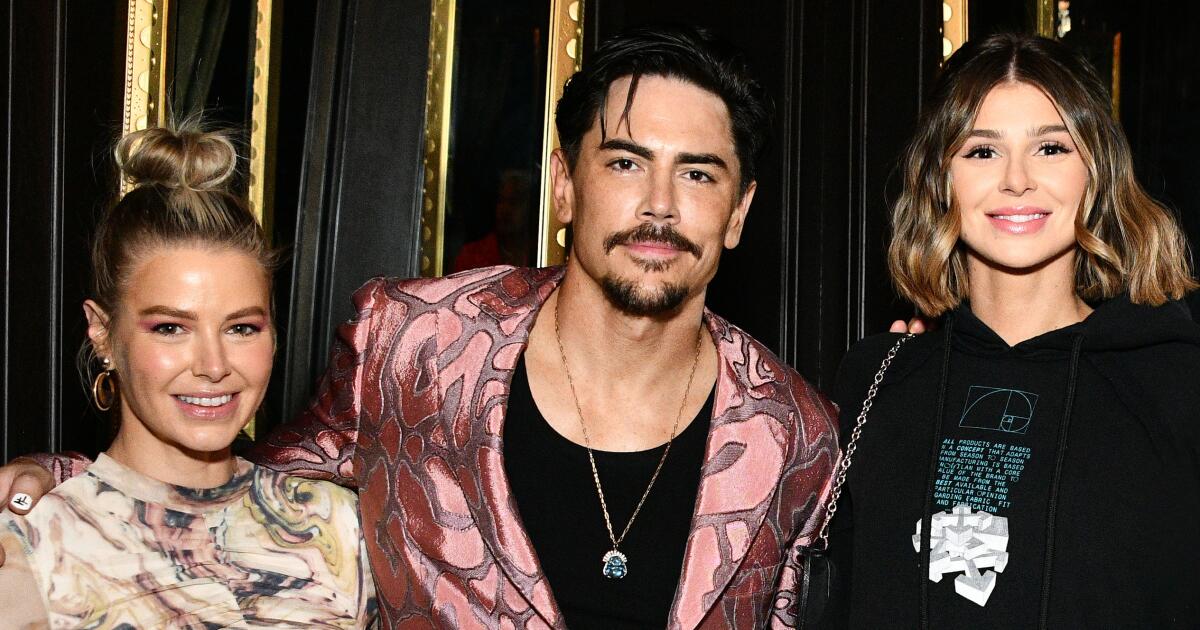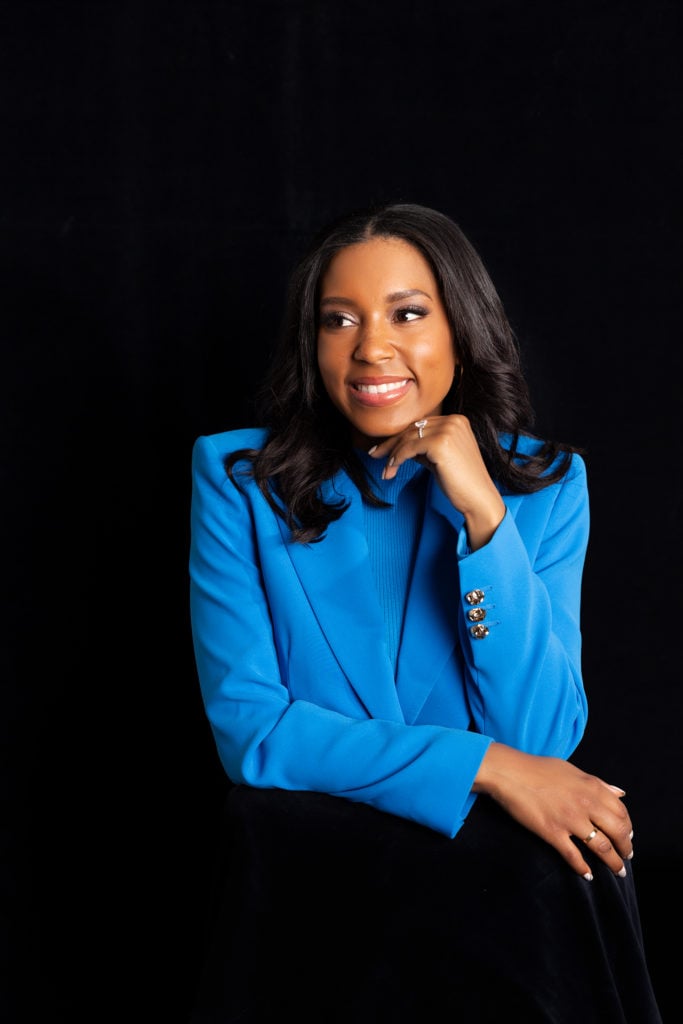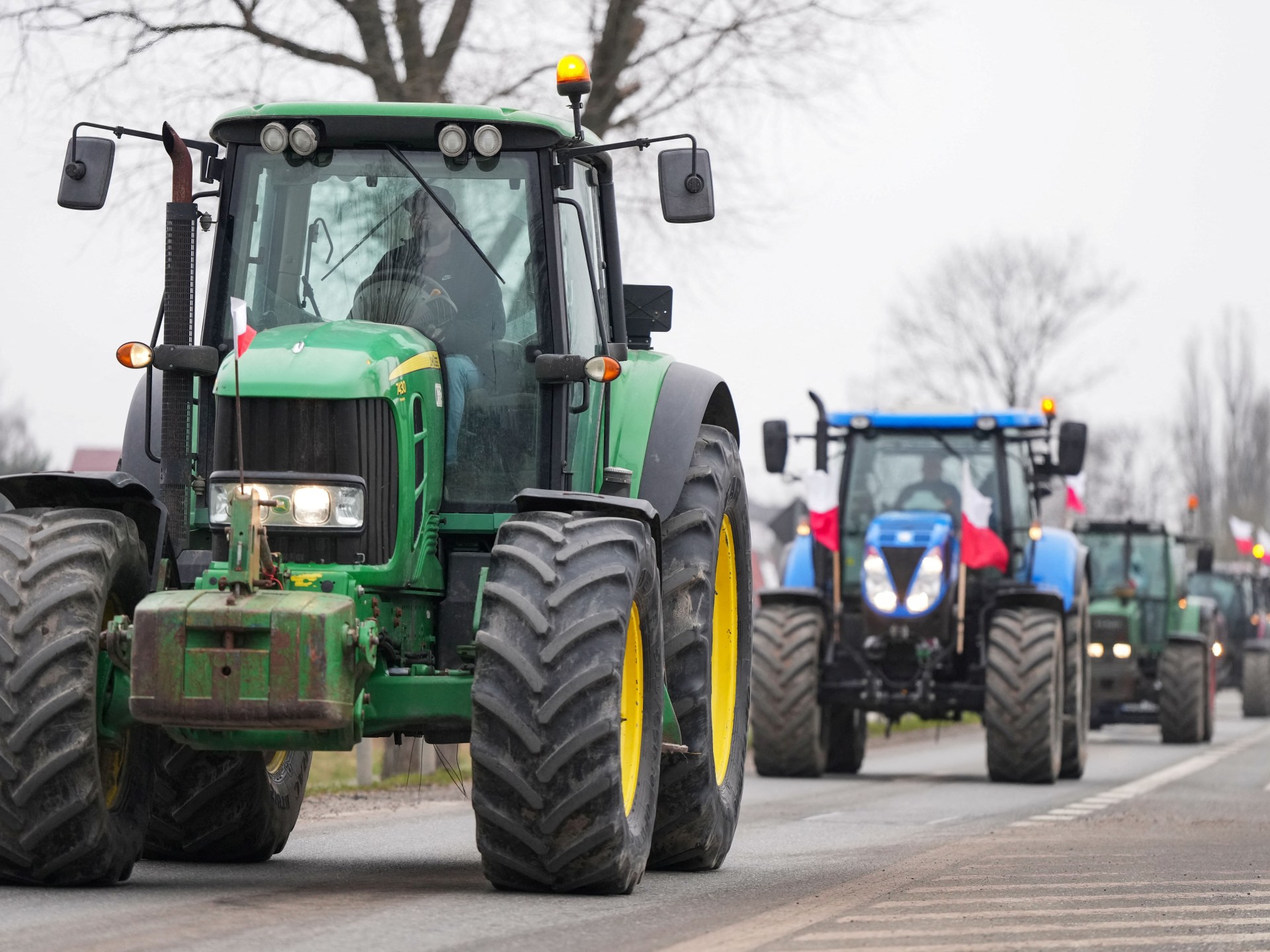JERUSALEM — Israel’s war cabinet deliberated Monday how to respond to Iran’s unprecedented aerial assault without rankling international allies and squandering an opportunity to build a strategic international alliance against Tehran.
Washington
Israel weighs strike on Iran to ‘send a message’ while preserving alliance

Those options include a potential strike on a facility in Tehran or a cyberattack, according to the official, who spoke on the condition of anonymity due to the sensitivity of the talks.
“Everybody agrees that Israel must respond,” the official said. “How to respond, when to respond, is the question.”
The United States, United Nations and Israel’s European and regional allies have all called for restraint following the Iranian barrage of more than 300 drones and missiles overnight Saturday.
The five-hour onslaught — which was a response to a deadly Israeli strike on an Iranian diplomatic compound in Syria this month — caused limited damage after being repelled by an international alliance including the United States, France and Britain, with assistance from countries in the Middle East.
That presents Israel with a model for coordination against Iran alongside what analysts describe as an unprecedented strategic opportunity for Israel to return to the international fold — and repair its regional alliances — after frictions over its war against Hamas. But it is still an opportunity that they said Israel could waste if it miscalculates its response and puts a short-term show of strength ahead of longer-term goals.
“This is an opportunity to create a new American-led regional security alignment against Iran if we can take advantage of it,” said Chuck Freilich, former deputy head of Israel’s National Security Council and a senior fellow at the Institute for National Security Studies in Tel Aviv. “Who would ever have thought that we would be part of a coalition that included the U.K. and France and Jordan and maybe other Arab countries?”
The success of Israel’s air defenses and the allied response in repelling the attack, which caused only minor damage in Israel and one serious injury, means that Israel can act from a position of confidence rather than one of panic, he added.
European leaders on Monday morning reiterated their concerns about the potential for the regional security situation to spiral. “The right thing to do is not to escalate,” British Foreign Secretary David Cameron said in a BBC television interview. “We are urging them as friends to think with head as well as heart, to be smart as well as tough, and to recognize that Iran suffered this defeat, because the attack was a failure.”
French President Emmanuel Macron expressed similar sentiments: “We are all worried about a possible escalation,” Macron told French radio.
U.S. officials have also emphasized to Israel that they won’t participate in any Israeli response amid fears that it could lead to a wider regional war. Israeli officials said they were mindful of the concerns.
“Our allies do not want us to go for an over-the-top response and we want to work with our allies, especially after the success we enjoyed with them,” the Israeli official said. “We don’t have to have cause casualties but it’s important that we do respond, because it sends a message to all those who want to harm us.”
A strike will do little to help Israel in its battle against Tehran’s proxies in the region and concerns over its nuclear program, said Yair Golan, former deputy IDF chief of staff.
“On different levels of intensity, Israel has been fighting Iran for years,” he said. “It will not stop tomorrow or the next day. And it will not stop if Israel reacts right now.”
Israel should focus on its long-term goals by leveraging the energy behind an emerging new alliance against Iran, he said. “We cannot be confused here. Iran has escalated the war,” he explained. “But Israel needs to act smartly in order to strengthen the regional and global front against them.”
The Hamas-led assault on Oct. 7, which killed 1,200 in the communities around Gaza, shattered the sense of security for citizens of Israel. Among the Israeli public, the success in repelling Saturday’s attack restored some national confidence and lessened a sense of international isolation.
“I think we did avoid something terrible Saturday night,” said Yosef Levy, a student buying groceries in Jerusalem on Saturday. Around him, the walls of the shop were plastered with posters showing the faces of Israelis still held captive in Gaza, some faded, some recently replaced. “It was like the world remembered that we are the ones under attack for a minute. I hope it changes something, I hope it ends the war. But I don’t think anything can change until our hostages are back with their families.”
The Israeli public has been polarized on how Israel should proceed in its war, with some prioritizing the return of the hostages through a deal with Hamas, and others prioritizing a push to all-out victory.
“We’re being pulled in multiple directions,” said Leigh Sapir, a 39-year-old attorney from Tel Aviv, after she dropped her toddler off at preschool on Monday, the first day that schools were open since the Saturday night attack. “On the one hand I encourage the government to respond and stand their ground, and on the other, I think the focus needs to be on a hostage deal at this point.”
But there has been little progress on a deal, with Hamas over the weekend rejecting the latest offer from Israel for at least a temporary pause in its offensive in exchange for the release of hostages.
It remains unclear how, if at all, the attack may affect operations in Gaza. Israel’s military called up two brigades of reserves for “operational missions in the Gaza Strip” on Sunday evening, stoking speculation that a Rafah assault could be sped up in the wake of the attack. Freilich said that the force did not appear of the “magnitude” needed for any Rafah operation, adding that it was more likely intended to refresh troops along Gaza’s dividing line than be the start of a buildup.
Golan also said that he didn’t see an Israeli intention to enter Rafah right now. However, the Iranian assault has already had an effect on the war, he said.
“Israel’s goals there are to secure the freedom of the hostages, to dismantle, to find an alternative to Hamas rule in Gaza,” he said. “In order to make that a reality, there’s a new incredible coordination against the Iran. We must leverage that, also in the Gazan context.”

Washington
Meet the 2024 Washington Women in Journalism Award Winners

Print Journalism
Carol Leonnig
The Washington Post
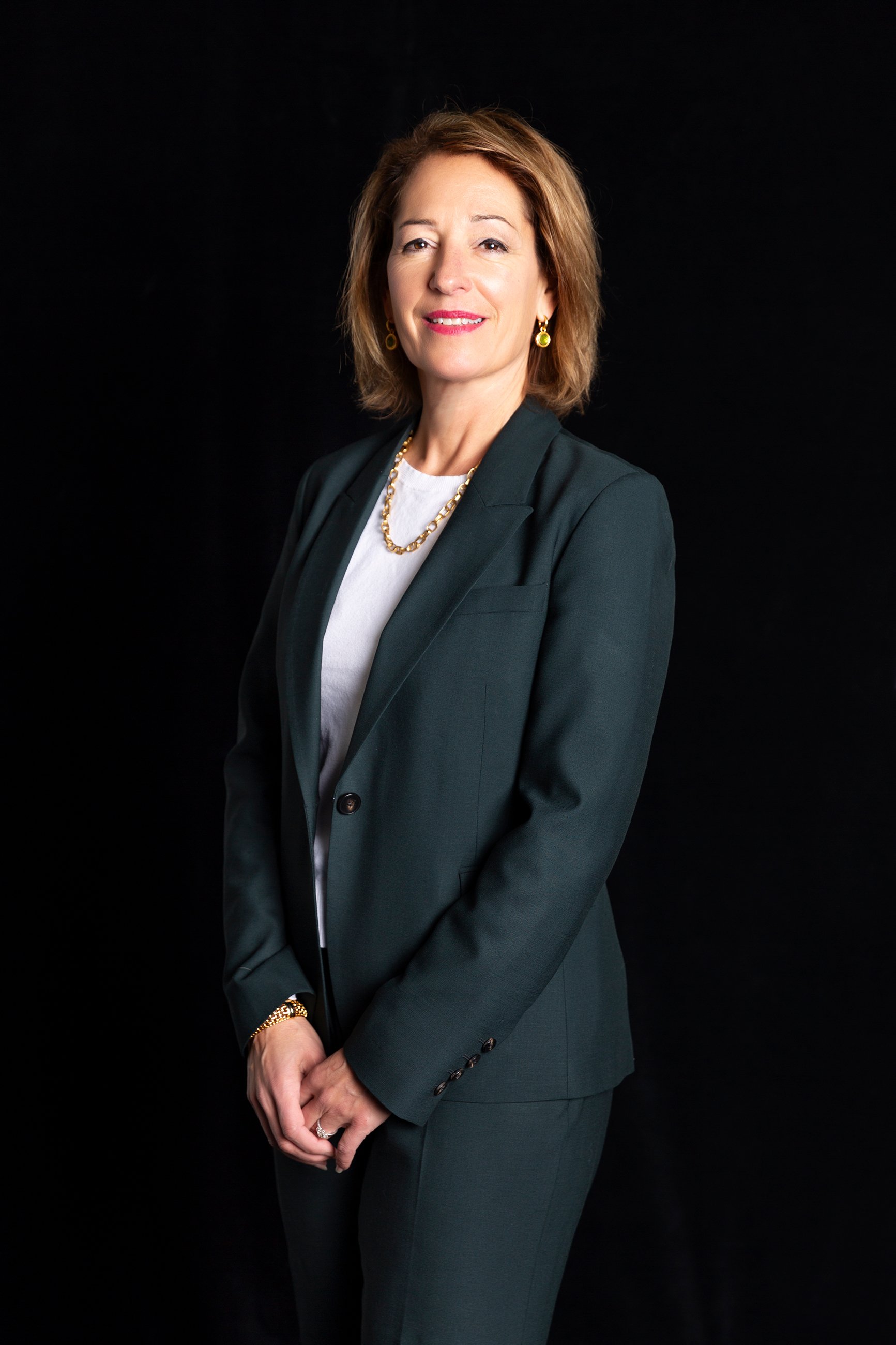
Carol Leonnig has spent much of her career reporting on local, state, and federal governments. Her hard-hitting investigations into the White House and federal agencies have earned her or teams she worked on four Pulitzer Prizes. At the Washington Post since 2000, she’s also an on-air contributor to NBC News and MSNBC and the author or coauthor of three New York Times bestsellers, including Zero Fail: The Rise and Fall of the Secret Service.
Where she grew up: Upper Marlboro.
First byline: “When I was a freshman, I got drafted by the editor of [the Bryn Mawr–Haverford College News] to report on a sledding accident involving students behind our dorm. She assigned me to go to the campus security office and look through their paper logs of how they responded to the accident, because there was a huge delay in getting emergency personnel to the site. I was able to piece together what caused the delay, and I was hooked.”
First journalism job: “In my senior year, I wrote some freelance pieces for the Philadelphia Inquirer. I ended up working there after college.”
First big story: “At the Charlotte Observer, I reported that the governor had overwritten state officials and career public servants’ recommendations to replace bridges [that were at risk of falling down] to get a big, new $8 million bridge built to help his neighbors in a rural community more quickly get from point A to point B. It was on the front page. We found out that the FBI was investigating the governor, and he held a press conference the next day and apologized.”
Hardest story she’s ever done: “Some of the hardest are the ones with people who don’t have boldface names. They are going through incredible trauma, like a mass shooting. The greatest honor that can be bestowed on us is to be entrusted to bring their experiences to a larger readership.”
Hardest part of her job: “Keeping your wits about you when you are being attacked in a very vicious way. The division in our country is so brutal in its attacks on journalists who report things that are factually true but that people don’t want to hear.”
Best journalism advice she’s received: “In the heat of the moment, in this competitive field, don’t let competition drive your decision. Stick to checking and rechecking every fact. No one will remember who published a minor story five minutes faster. Everyone will remember a mistake made in the rush of competition.”
Broadcast Journalism
Back to Top
Rachel Scott
ABC News
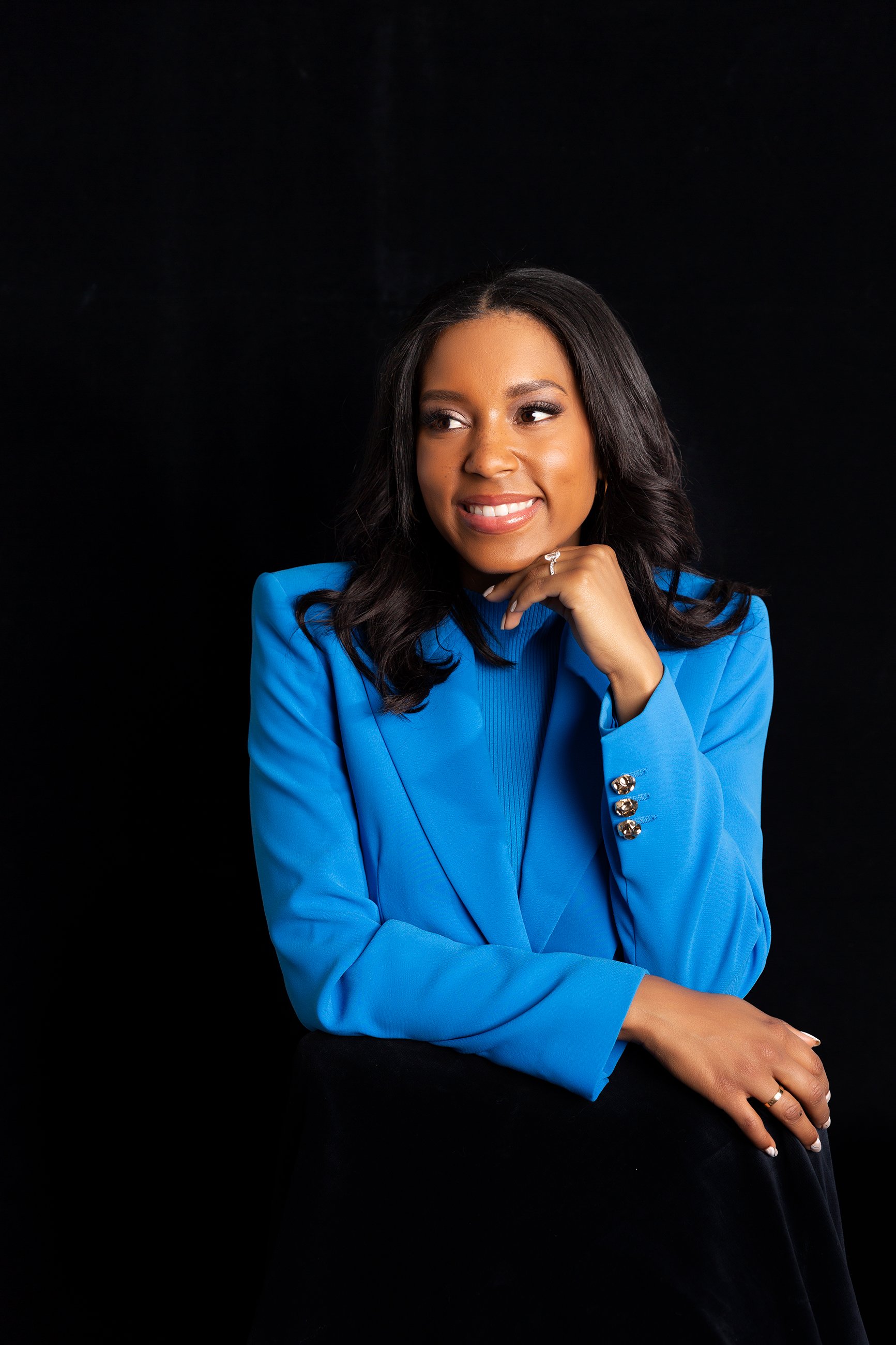

When Rachel Scott started reporting on Capitol Hill for ABC News in 2021, she couldn’t have predicted what she’d be covering her first day–January 6. The job has kept her on her toes ever since: taking her to Geneva, where she pressed Vladimir Putin on human rights; to Texas, where her coverage on the abortion ban earned her a Peabody Award; and to offices all over Capitol Hill.
Where she grew up: Diamond Bar, California.
First journalism job: Production associate for ABC News Live.
What drew her to journalism: “It wasn’t until I had an internship at the White House in 2012 that I discovered my passion for political journalism. I had the opportunity to sit in on several interviews that President Barack Obama did with Diane Sawyer and Barbara Walters, and it was in those rooms I realized that I wanted to be the one asking the tough questions on behalf of the American people.”
On covering January 6: “I was assigned to be outside of the Capitol for what was described as a Trump rally. I remember when things took a crazy turn. George Stephanopoulos asked me to describe what was going on, and what I described was chaos as rioters started to storm the Capitol. I reported outside for hours, stretching into the very late evening.”
Work she’s proudest of: “I traveled to Geneva for President Biden’s high-stakes meeting with Vladimir Putin, and we found out the day before that President Biden and Putin would be holding separate press conferences. I entered [Putin’s] press conference not knowing if he’d call on an American journalist. But he did. When I was called on, I raised the case of Alexei Navalny. I asked President Putin why all of his political prisoners were either dead, in prison, or poisoned. I asked what he was so afraid of. Coming back to my hotel that night, there were students gathered below the balcony of the hotel. They noticed me and started shouting, ‘Freedom of the press!’ In that moment, I understood the gravity of the questions we ask and how much it matters.”
One female journalist she admires: “Diane Sawyer—without question. When I was a USC student, Diane Sawyer came and spoke to journalism students. She told us, ‘Journalism is the business of changing the world.’ I have never forgotten it. When I came to ABC and started covering reproductive rights, Diane reached out to partner on a special. To reach out and partner with a younger journalist speaks volumes to what she has done for women in this industry.”
Lifetime Achievement
Back to Top
Kara Swisher
Vox Media/Podcaster
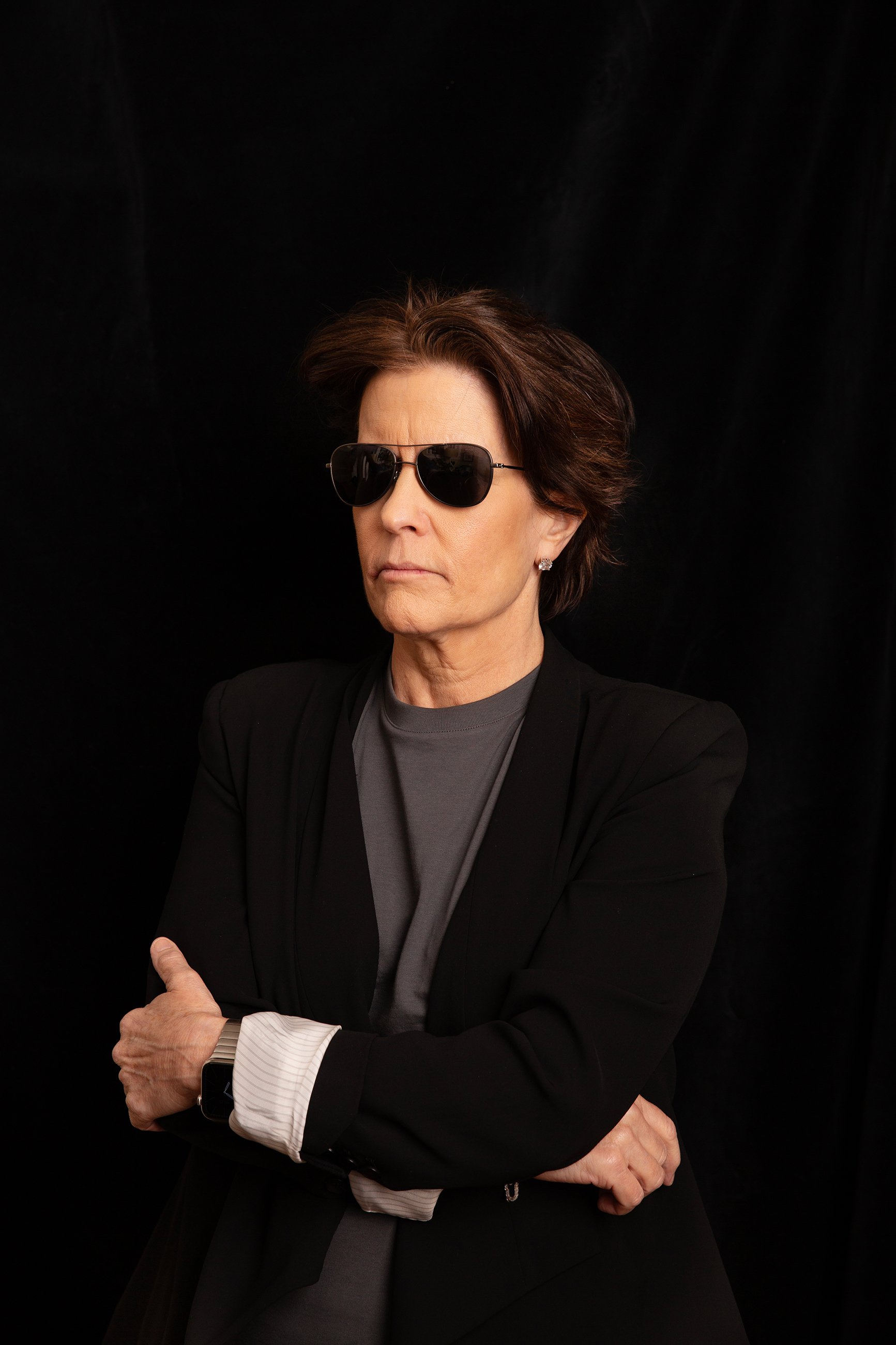

One of the earliest reporters on the internet beat, Kara Swisher has interviewed nearly every influential innovator and entrepreneur in the tech world. Between her commentary on CNN and her hit podcasts, On With Kara Swisher and Pivot, she has a knack for catching the latest scoops on the fast-moving industry. In her recent bestselling memoir, Burn Book: A Tech Love Story, Swisher gives an insider perspective into Silicon Valley’s titans and the impact of their innovations on our world.
Where she grew up: “A lot of places—Long Island and Princeton, New Jersey, principally.”
First byline: “I wrote columns at the Hoya at Georgetown University. I just wrote about campus life and things that affected students.”
First journalism job: “I started writing similar stories for the Washington Post. I was their stringer from the campus.”
First big story: “There was a family in Washington who was one of the wealthiest—they owned a string of retail stores. I wrote about the breakup of the family. Herbert Haft and Robert Haft—they were father and son, and they had a war. It was sort of like King Lear.”
What drew her to journalism: “I’m a curious person, and I like asking questions. I’m a good writer. I wasn’t good at other things. I wanted to be an architect, and I wasn’t good at that.”
One hard thing about her job: “Reporters play a really important part in society, and the current attacks on them are depressing and stupid.”
Best journalism advice she’s received: “Walt Mossberg, who I dedicated my book to, always was like, ‘Just go and find the truth and ask direct questions.’ It’s not very complicated, but I think it’s really important to do what you do with integrity and intelligence, as well as try to be interesting and be interested at the same time.”
A piece of advice she’d share to budding journalists: “Just work hard and ask good questions. You have to know what you’re talking about. You have to be accurate. You have to be prepared. Constantly assess what you need to improve on.”
What she’d like to see change to make the journalism industry better for women: “Hire the most diverse groups of people. I mean not just race and gender but backgrounds and political affiliation. I think it’s better to get different perspectives.”
Star to Watch
Back to Top
Meridith McGraw
Politico
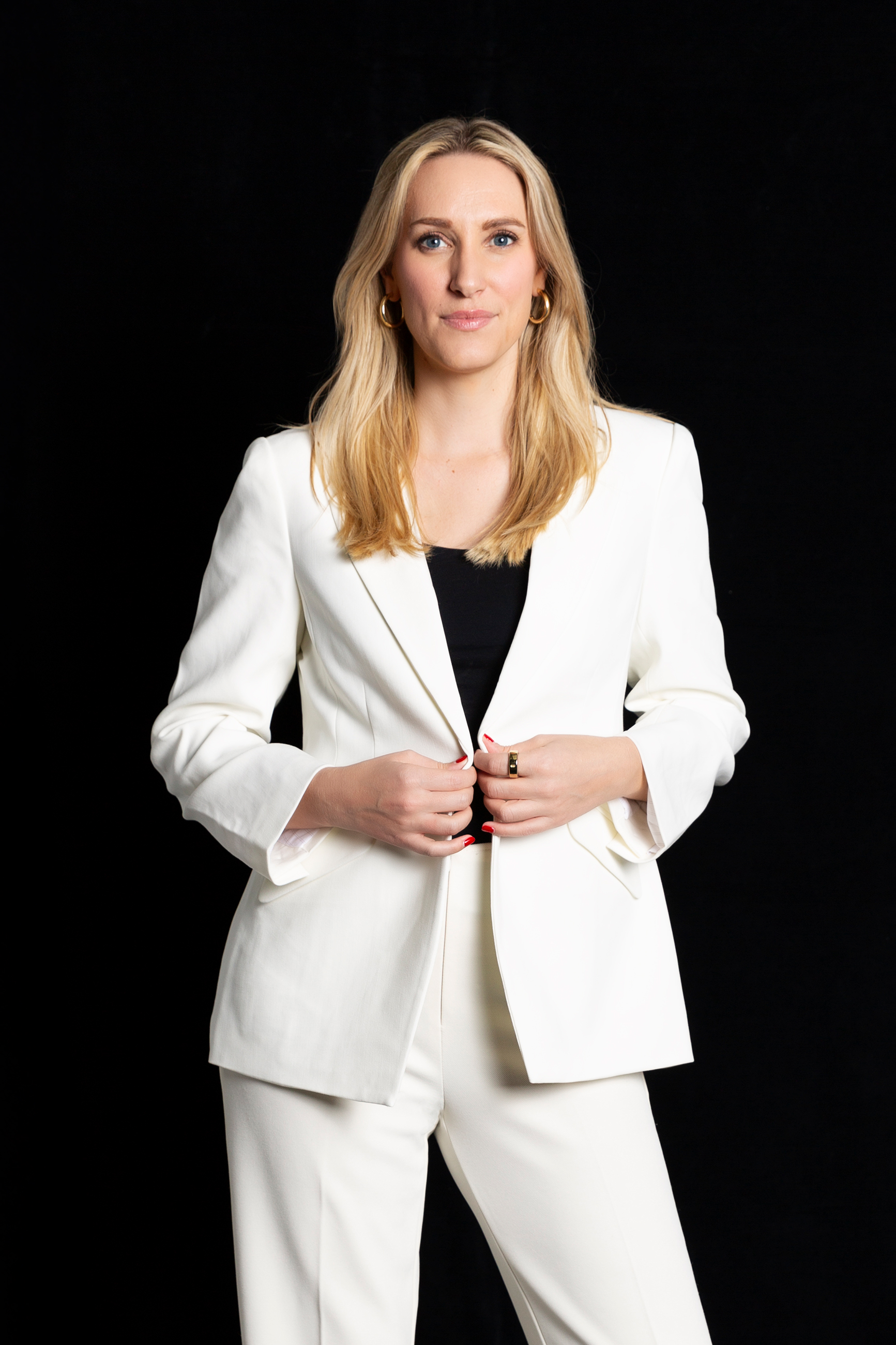

It would be an understatement to say that 2024 has been–and will continue to be–a whirlwind for Meridith McGraw. As Politico’s national political correspondent, she’s in charge of covering all things related to Donald Trump, the 2024 election, and Republican politics. Prior to joining Politico in 2019, she covered the White House and Capitol Hill for ABC News.
Where she grew up: Vienna, West Virginia.
What drew her to journalism: “I love to write. I’m interested in politics. And I grew up with parents who encouraged debate and conversation around the dinner table on what was going on in the world.”
First journalism job: “The Frank Reynolds Fellowship at ABC News. I went to Columbia Journalism School and had my eye on that internship from day one. I really wanted to come to Washington.”
First byline: “A very short story on the National Zoo’s new baby panda, which anybody in DC knows is a big deal.”
Hardest story she’s ever done: “It’s hard to pinpoint one story. [My first year at Politico] was such a challenging time. It was during the pandemic, and I was on the White House team. Nobody knew what was going on in terms of Covid. The George Floyd protests were happening. It was a particularly important and challenging time to be a reporter in DC.”
Best journalism advice she’s received: “Try to zig when other people zag. Think of unexpected or uncovered angles to the stories that everybody’s reading.”
Most challenging aspect of covering Trump: “At times, it feels hard to keep up with the volume of news. That’s why it’s important to cut through the noise and help people discern the most important things they need to know.”
How she stays sane covering politics in 2024: “I’m really lucky to have great friends and family, and an adorable dog [Daisy, a basset hound], but a big part of it is understanding the historic importance of the moment we’re in.”
What she’d like to see change in the journalism industry to make it better for women: “Pay equity continues to be something we need to see [improve].”
Favorite part of the job: “I’m happy not being the smartest person in the room and getting to learn from other people. I love that this job allows me to call up lawmakers, expert thinkers, [and] everyday people I wouldn’t normally encounter.”
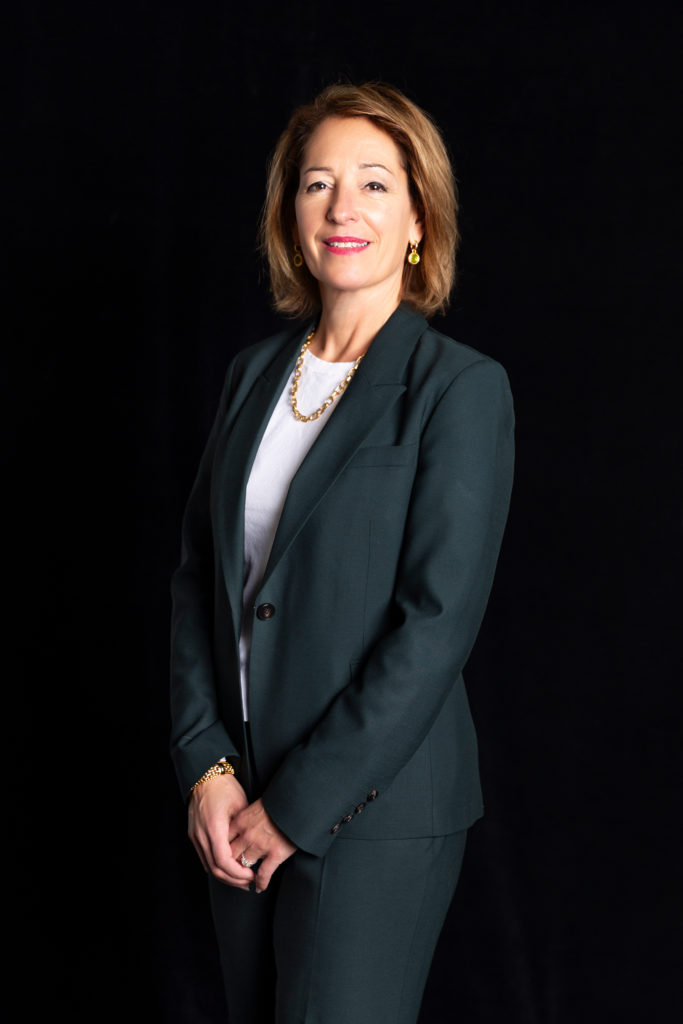

Print Journalism
Back to Top
Carol Leonnig
The Washington Post
Carol Leonnig has spent much of her career reporting on local, state, and federal governments. Her hard-hitting investigations into the White House and federal agencies have earned her or teams she worked on four Pulitzer Prizes. At the Washington Post since 2000, she’s also an on-air contributor to NBC News and MSNBC and the author or coauthor of three New York Times bestsellers, including Zero Fail: The Rise and Fall of the Secret Service.
Where she grew up: Upper Marlboro.
First byline: “When I was a freshman, I got drafted by the editor of [the Bryn Mawr–Haverford College News] to report on a sledding accident involving students behind our dorm. She assigned me to go to the campus security office and look through their paper logs of how they responded to the accident, because there was a huge delay in getting emergency personnel to the site. I was able to piece together what caused the delay, and I was hooked.”
First journalism job: “In my senior year, I wrote some freelance pieces for the Philadelphia Inquirer. I ended up working there after college.”
First big story: “At the Charlotte Observer, I reported that the governor had overwritten state officials and career public servants’ recommendations to replace bridges [that were at risk of falling down] to get a big, new $8 million bridge built to help his neighbors in a rural community more quickly get from point A to point B. It was on the front page. We found out that the FBI was investigating the governor, and he held a press conference the next day and apologized.”
Hardest story she’s ever done: “Some of the hardest are the ones with people who don’t have boldface names. They are going through incredible trauma, like a mass shooting. The greatest honor that can be bestowed on us is to be entrusted to bring their experiences to a larger readership.”
Hardest part of her job: “Keeping your wits about you when you are being attacked in a very vicious way. The division in our country is so brutal in its attacks on journalists who report things that are factually true but that people don’t want to hear.”
Best journalism advice she’s received: “In the heat of the moment, in this competitive field, don’t let competition drive your decision. Stick to checking and rechecking every fact. No one will remember who published a minor story five minutes faster. Everyone will remember a mistake made in the rush of competition.”
Broadcast Journalism
Back to Top
Rachel Scott
ABC News
When Rachel Scott started reporting on Capitol Hill for ABC News in 2021, she couldn’t have predicted what she’d be covering her first day–January 6. The job has kept her on her toes ever since: taking her to Geneva, where she pressed Vladimir Putin on human rights; to Texas, where her coverage on the abortion ban earned her a Peabody Award; and to offices all over Capitol Hill.
Where she grew up: Diamond Bar, California.
First journalism job: Production associate for ABC News Live.
What drew her to journalism: “It wasn’t until I had an internship at the White House in 2012 that I discovered my passion for political journalism. I had the opportunity to sit in on several interviews that President Barack Obama did with Diane Sawyer and Barbara Walters, and it was in those rooms I realized that I wanted to be the one asking the tough questions on behalf of the American people.”
On covering January 6: “I was assigned to be outside of the Capitol for what was described as a Trump rally. I remember when things took a crazy turn. George Stephanopoulos asked me to describe what was going on, and what I described was chaos as rioters started to storm the Capitol. I reported outside for hours, stretching into the very late evening.”
Work she’s proudest of: “I traveled to Geneva for President Biden’s high-stakes meeting with Vladimir Putin, and we found out the day before that President Biden and Putin would be holding separate press conferences. I entered [Putin’s] press conference not knowing if he’d call on an American journalist. But he did. When I was called on, I raised the case of Alexei Navalny. I asked President Putin why all of his political prisoners were either dead, in prison, or poisoned. I asked what he was so afraid of. Coming back to my hotel that night, there were students gathered below the balcony of the hotel. They noticed me and started shouting, ‘Freedom of the press!’ In that moment, I understood the gravity of the questions we ask and how much it matters.”
One female journalist she admires: “Diane Sawyer—without question. When I was a USC student, Diane Sawyer came and spoke to journalism students. She told us, ‘Journalism is the business of changing the world.’ I have never forgotten it. When I came to ABC and started covering reproductive rights, Diane reached out to partner on a special. To reach out and partner with a younger journalist speaks volumes to what she has done for women in this industry.”
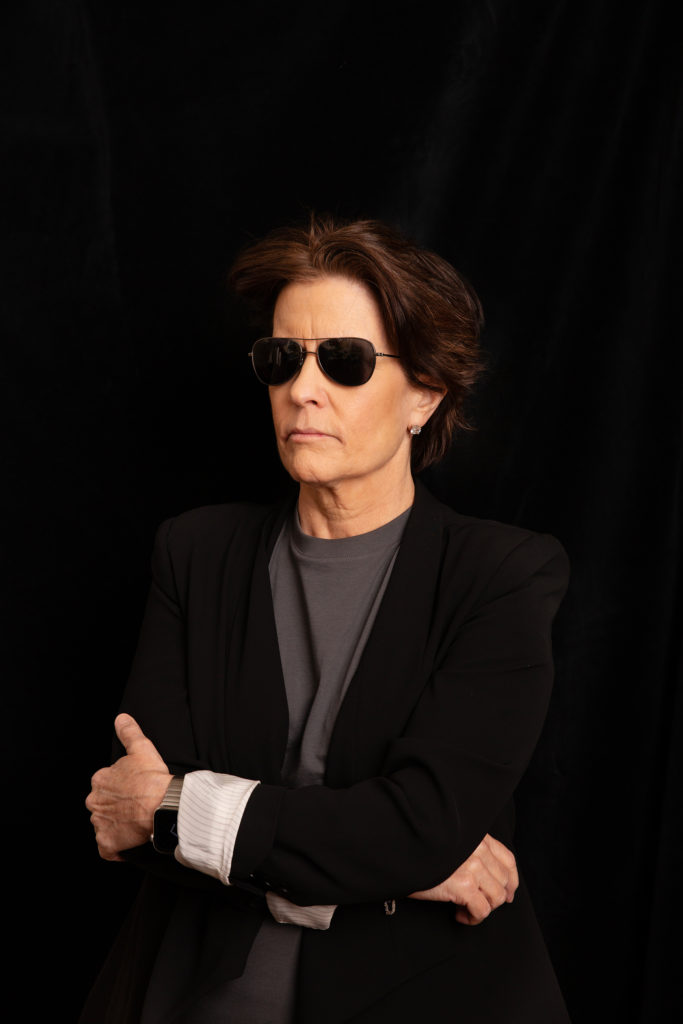

Lifetime Achievement
Back to Top
Kara Swisher
Vox Media/Podcaster
One of the earliest reporters on the internet beat, Kara Swisher has interviewed nearly every influential innovator and entrepreneur in the tech world. Between her commentary on CNN and her hit podcasts, On With Kara Swisher and Pivot, she has a knack for catching the latest scoops on the fast-moving industry. In her recent bestselling memoir, Burn Book: A Tech Love Story, Swisher gives an insider perspective into Silicon Valley’s titans and the impact of their innovations on our world.
Where she grew up: “A lot of places—Long Island and Princeton, New Jersey, principally.”
First byline: “I wrote columns at the Hoya at Georgetown University. I just wrote about campus life and things that affected students.”
First journalism job: “I started writing similar stories for the Washington Post. I was their stringer from the campus.”
First big story: “There was a family in Washington who was one of the wealthiest—they owned a string of retail stores. I wrote about the breakup of the family. Herbert Haft and Robert Haft—they were father and son, and they had a war. It was sort of like King Lear.”
What drew her to journalism: “I’m a curious person, and I like asking questions. I’m a good writer. I wasn’t good at other things. I wanted to be an architect, and I wasn’t good at that.”
One hard thing about her job: “Reporters play a really important part in society, and the current attacks on them are depressing and stupid.”
Best journalism advice she’s received: “Walt Mossberg, who I dedicated my book to, always was like, ‘Just go and find the truth and ask direct questions.’ It’s not very complicated, but I think it’s really important to do what you do with integrity and intelligence, as well as try to be interesting and be interested at the same time.”
A piece of advice she’d share to budding journalists: “Just work hard and ask good questions. You have to know what you’re talking about. You have to be accurate. You have to be prepared. Constantly assess what you need to improve on.”
What she’d like to see change to make the journalism industry better for women: “Hire the most diverse groups of people. I mean not just race and gender but backgrounds and political affiliation. I think it’s better to get different perspectives.”
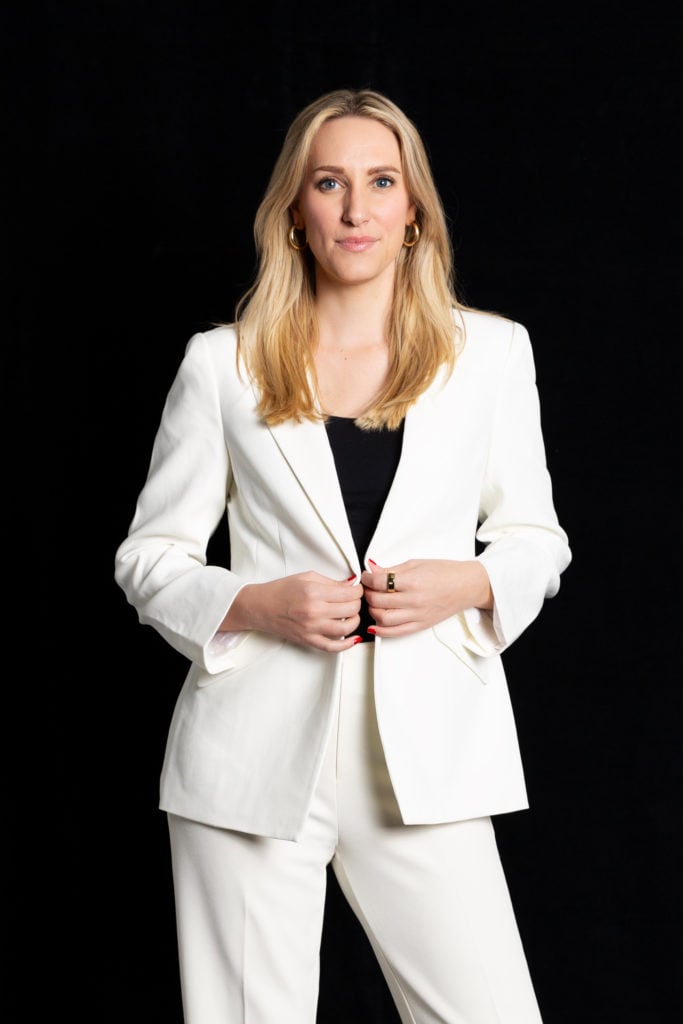

Star to Watch
Back to Top
Meridith McGraw
Politico
It would be an understatement to say that 2024 has been–and will continue to be–a whirlwind for Meridith McGraw. As Politico’s national political correspondent, she’s in charge of covering all things related to Donald Trump, the 2024 election, and Republican politics. Prior to joining Politico in 2019, she covered the White House and Capitol Hill for ABC News.
Where she grew up: Vienna, West Virginia.
What drew her to journalism: “I love to write. I’m interested in politics. And I grew up with parents who encouraged debate and conversation around the dinner table on what was going on in the world.”
First journalism job: “The Frank Reynolds Fellowship at ABC News. I went to Columbia Journalism School and had my eye on that internship from day one. I really wanted to come to Washington.”
First byline: “A very short story on the National Zoo’s new baby panda, which anybody in DC knows is a big deal.”
Hardest story she’s ever done: “It’s hard to pinpoint one story. [My first year at Politico] was such a challenging time. It was during the pandemic, and I was on the White House team. Nobody knew what was going on in terms of Covid. The George Floyd protests were happening. It was a particularly important and challenging time to be a reporter in DC.”
Best journalism advice she’s received: “Try to zig when other people zag. Think of unexpected or uncovered angles to the stories that everybody’s reading.”
Most challenging aspect of covering Trump: “At times, it feels hard to keep up with the volume of news. That’s why it’s important to cut through the noise and help people discern the most important things they need to know.”
How she stays sane covering politics in 2024: “I’m really lucky to have great friends and family, and an adorable dog [Daisy, a basset hound], but a big part of it is understanding the historic importance of the moment we’re in.”
What she’d like to see change in the journalism industry to make it better for women: “Pay equity continues to be something we need to see [improve].”
Favorite part of the job: “I’m happy not being the smartest person in the room and getting to learn from other people. I love that this job allows me to call up lawmakers, expert thinkers, [and] everyday people I wouldn’t normally encounter.”
Back to Top
Past Winners
2023
Jacqueline Alemany
The Washington Post
Gloria Borger
CNN
Asma Khalid
NPR
Kelly O’Donnell
NBC
2022
Kaitlan Collins
CNN
Kathleen Parker
The Washington Post
Martha Raddatz
ABC
Ayesha Rascoe
NPR
2021
Yamiche Alcindor
PBS
Karen Attiah
The Washington Post
Susan Glasser
The New Yorker
Norah O’Donnell
CBS
2020
Molly Ball
Time
Rita Braver
CBS
Anna Palmer
Politico
Kristen Welker
NBC
2019
Andrea Mitchell
NBC
Ashley Parker
The Washington Post
Abby Phillip
CNN
Amanda Terkel
HuffPost
2018
Amanda Bennett
Voice of America
Audie Cornish
NPR
Lynn Sweet
The Chicago Sun-Times
Amy Walter
The Cook Political Report
2017
Mary Katharine Ham
CNN
Mary Louise Kelly
NPR
Jane Mayer
The New Yorker
Cokie Roberts
NPR/ABC/PBS
2016
Dana Bash
CNN
Kathryn Lopez
National Review
Susan Page
USA Today
Carolyn Ryan
The New York Times
This article appears in the May 2024 issue of Washingtonian.
Washington
N.Y. must ban menthol cigarettes: Washington stalls so Albany must act

A year ago, to her credit, Gov. Hochul tried to have New York ban menthol flavored cigarettes, which cause disproportionate sickness and death in the Black population. But there was a heavy lobbying effort in Albany by the tobacco cartel cloaked under the guise of civil rights that a ban, as some other states have, would somehow harm the African-American community.
The lies worked, as did the argument that there was no need for New York to act because Washington was going to impose a national ban a few months down the road. So Hochul’s ban was set aside.
That promised national ban from the Food and Drug Administration and parent Department of Health and Human Services was expected last fall. But it didn’t happen and now it’s been pushed off again. Don’t expect anything before the November election. And who knows what will happen after that.
On Friday, HHS Secretary Xavier Becerra gave a statement that was as pathetically weak as it was short:
“This rule has garnered historic attention and the public comment period has yielded an immense amount of feedback, including from various elements of the civil rights and criminal justice movement. It’s clear that there are still more conversations to have, and that will take significantly more time.”
Compare that to what the same man said two years ago: “The proposed rules would help prevent children from becoming the next generation of smokers and help adult smokers quit. Additionally, the proposed rules represent an important step to advance health equity by significantly reducing tobacco-related health disparities.”
The “immense amount of feedback” Becerra now prattles about is from the tobacco lobbyists and their fronts. The secretary’s phrase of “more conversations” means more delay and more menthol tobacco sales with more sickness and more death. The death cartel keeps cashing in on the lungs and bodies of Black Americans.
The NAACP agrees with the American Cancer Society, which agrees with the American Heart Association, which agrees with the American Lung Association, which agrees with a united public health establishment and hospitals and physicians.
Joe Biden needs the votes of Black Americans this fall and there is plenty of speculation that political considerations were a factor in this public health matter. Yes, menthol cigarette use is largely centered in the Black community, however a ban won’t harm the community, but help it. The most important civil right is the right to live and menthol kills and it kills far more Black people.
How perverse to claim that harming the Black community is a civil right cause.
On Friday, the FDA did do something, however, in finalizing Guidance for Industry (GFI) #120: Veterinary Feed Directive Regulation Questions and Answers about the use of approved animal drugs intended for use in or on the feed of food-producing animals that require veterinary oversight. That’s important, but more important than a known killer preying on the Black community? A menthol ban would reduce the amount of smoking, saving lives.
Now that feds have succumbed to the smokescreen of Tobacco Row, it’s back to the states. The Legislature has more than a full month before they break for the year. Ban menthol tobacco in New York.
Washington
Historians uncover 18th-century bottles with mysterious liquid at George Washington's Mt. Vernon
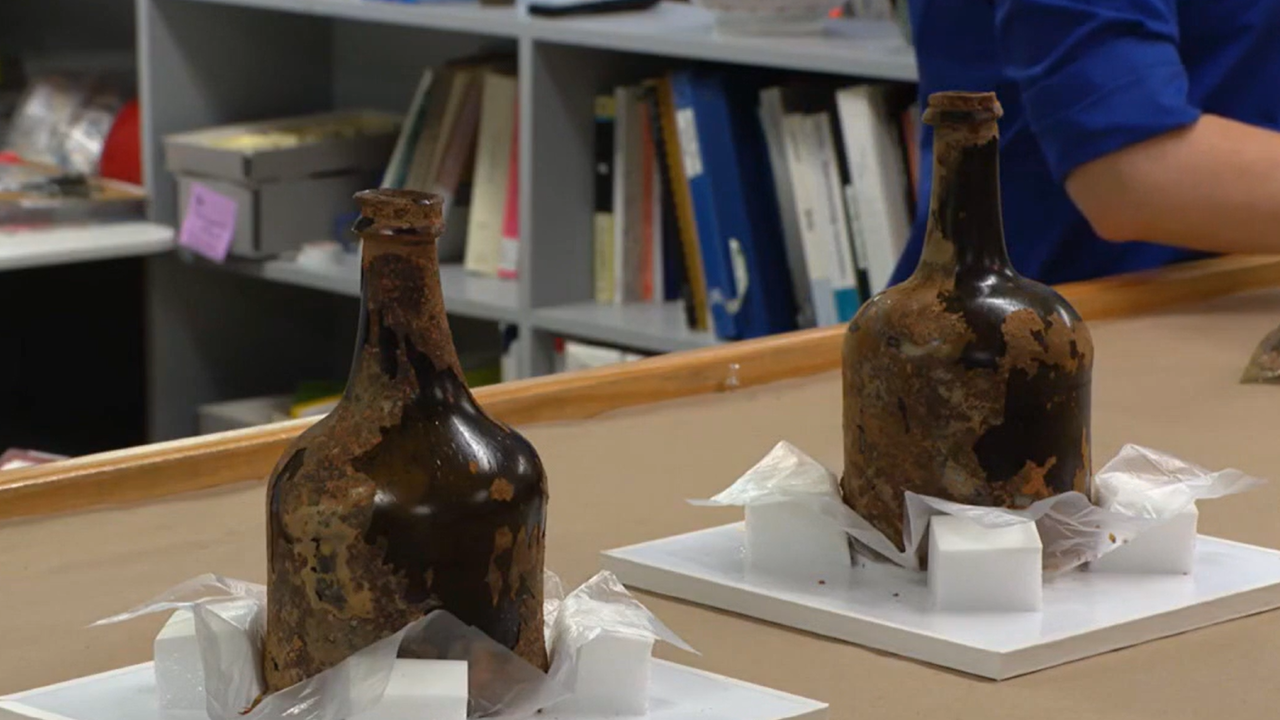
Archaeologists recently discovered two glass bottles filled with a mysterious liquid at George Washington’s Mount Vernon estate in Virginia.
The archaeologist who found the bottles, Nick Beard, told FOX 5 DC that he was digging in the mansion’s cellar as part of a revitalization project.
Beard found the top of a bottle, and then the whole bottle, before noticing a second bottle. Astoundingly, the bottles contained a liquid that had miraculously survived the past three centuries.
“Just the fact that there was liquid at all. That, right there, sets off alarm bells,” Beard said. “If there’s water, or liquid, pooling in there like that, that means it’s very intact, it’s in very good shape.”
STRANGE ROCK UNCOVERED DURING SEA SEARCH TURNS OUT TO BE ANCIENT BATTLE GEAR
Archaeologists were digging in the mansion’s cellar as part of a revitalization project when they found the old bottles. (FOX 5 DC)
Experts believe that the bottles were originally filled with cherries. The glass bottles were placed in the ground between 1758 and 1776 to refrigerate food.
“For whatever reason, these were left behind and they were in pristine condition, and that’s why this is such an extraordinary find because you just don’t find 18th-century food remains, intact, outside of things like animal bones, which are pretty durable,” Mount Vernon principal archaeologist Jason Boroughs told FOX 5.
400-YEAR-OLD BATTLE GEAR DISCOVERED BY METAL DETECTORIST IN POLAND: ‘UNIQUE FIND’
Placing the produce in a bottle underground was the most effective way of preserving it from the intense Virginia heat.
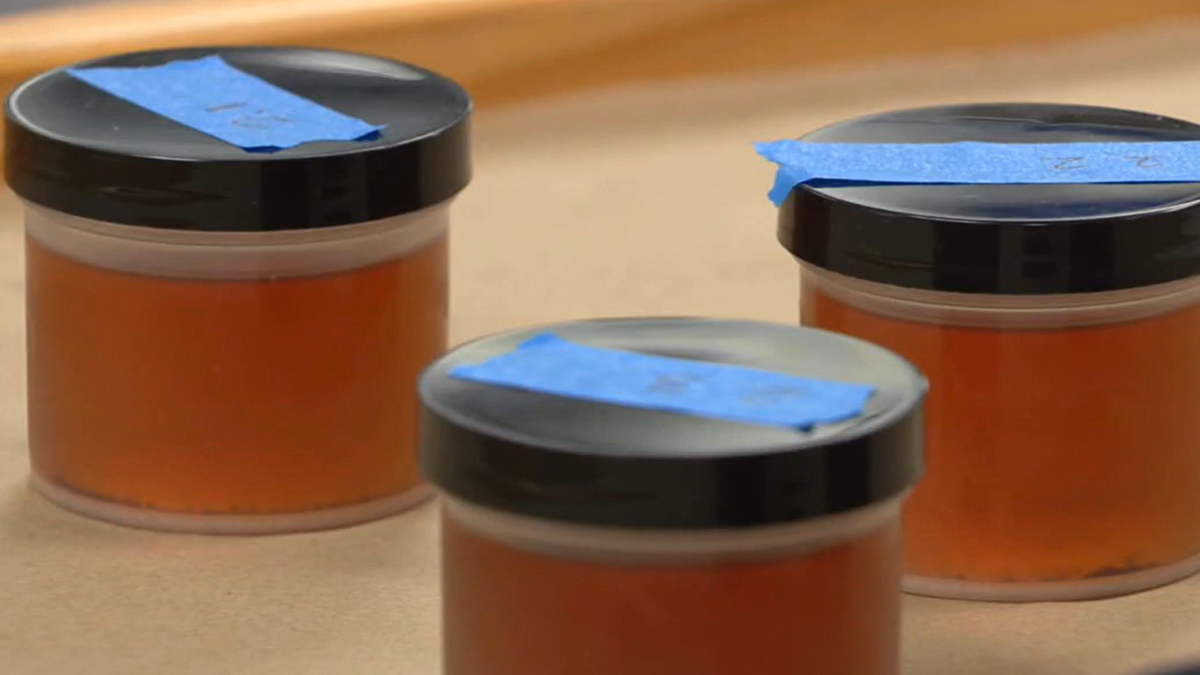
The liquids from the 300-year-old jars will be examined. They are believed to be the remains of cherries. (FOX 5 DC)
“One of the best ways to store these types of fruits and vegetables was underground,” Boroughs added. “So sometime after 1758, but before 1776, someone dug a pit… sort of a rectangular, about a foot deep, hole through one of the floors in the cellar, these bottles were set in, and then it was filled with a dense clay.”
CLICK HERE TO SIGN UP FOR OUR LIFESTYLE NEWSLETTER
The orange liquid was poured out of the bottles and transferred into new containers to be examined. Historians believe that the discovery will not only shed light on how food was preserved at Mount Vernon, but may also reveal new details about slavery on the plantation.
“It’s astounding for us,” curator Lily Carhart told FOX 5. “It’s one of those once-in-a-lifetime sort of things.”
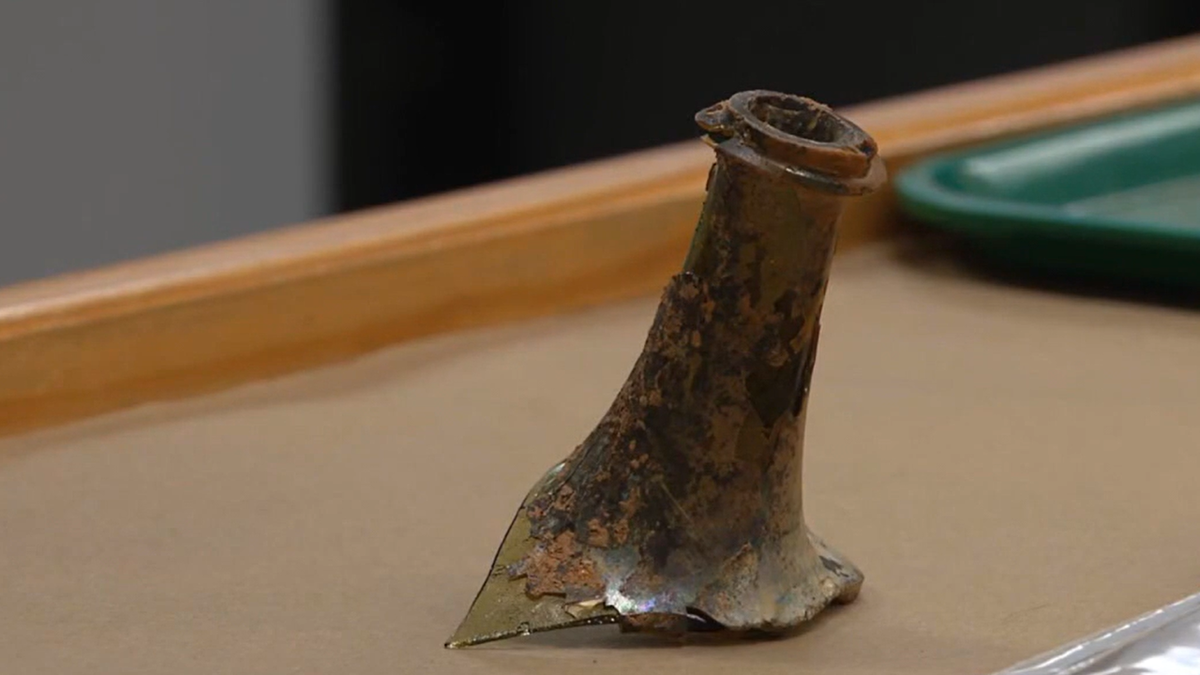
Archaeologists say that finding food remains in centuries-old bottles is extremely rare. (FOX 5 DC)
CLICK HERE TO GET THE FOX NEWS APP
Fox News Digital reached out to Mount Vernon for comment, but did not immediately hear back.
For more Lifestyle articles, visit www.foxnews.com/lifestyle.
-

 Kentucky1 week ago
Kentucky1 week agoKentucky first lady visits Fort Knox schools in honor of Month of the Military Child
-

 News1 week ago
News1 week agoIs this fictitious civil war closer to reality than we think? : Consider This from NPR
-

 World1 week ago
World1 week agoShipping firms plead for UN help amid escalating Middle East conflict
-

 Politics1 week ago
Politics1 week agoICE chief says this foreign adversary isn’t taking back its illegal immigrants
-

 Politics1 week ago
Politics1 week ago'Nothing more backwards' than US funding Ukraine border security but not our own, conservatives say
-

 News1 week ago
News1 week agoThe San Francisco Zoo will receive a pair of pandas from China
-

 World1 week ago
World1 week agoTwo Mexican mayoral contenders found dead on same day
-

 Politics1 week ago
Politics1 week agoRepublican aims to break decades long Senate election losing streak in this blue state

